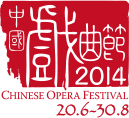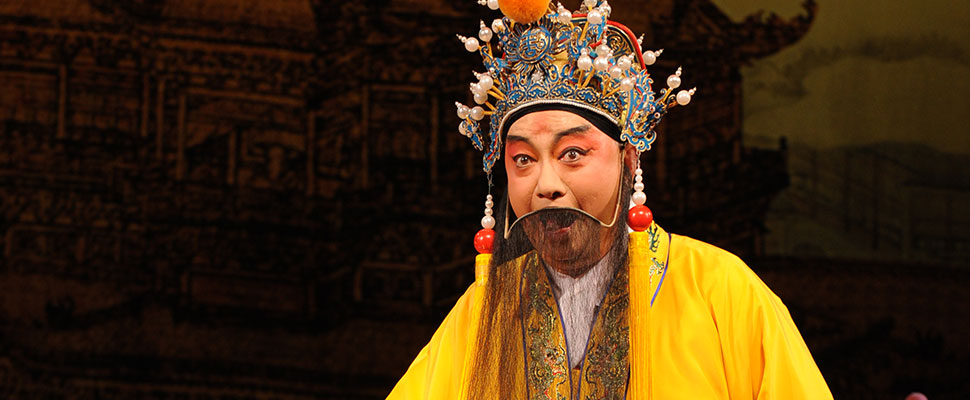
Foreword
It has been five years since the Chinese Opera Festival was launched in 2010. Thanks to the staunch support from various quarters, the Festival has grown from strength to strength, and today it has become a remarkable platform for Chinese traditional theatre. Artists and audiences alike have shared the many-splendoured and inspiring moments on the stage. Chinese operas are representative of the rich gamut of human emotions and humanistic values. For this year’s Festival, we have prepared many operatic productions that showcase the diversity of regional opera and vernacular music. We invite you all to come and share the ingenious amalgamation of ethnic theatre and music that is Chinese opera.
In celebration of the fifth year of the Festival, we are honoured to have Pei Yanling, esteemed “a true treasure of China and humankind” for her galactic virtuosity in traditional theatre, to open the Festival with the premium cast of Peking Opera Research Center of Hebei. They will be performing some of the most remarkable pieces from both the ‘civil’ and the ‘military’ categories. In Exploring the Art of Chinese Traditional Theatre, Pei will guide the audience to explore the art of Peking Opera and Kunqu Opera. In Yue Opera (also known as “Shaoxing Opera”), the vocal styles of actors in xiaosheng (young man roles) can be categorized into four main schools after the four legendary stars: Yin Guifang, Fan Ruijuan, Xu Yulan and Lu Jinhua. Four representative xiaosheng actors in Yue Opera – Zhao Zhigang, Wu Fenghua, Zhang Xiaojun and Xu Biaoxin – will partner some of the best dan (female roles) actors to present gems in Yue Opera, including the very famous The Butterfly Lovers. The occasion promises to be a sumptuous feast for Yue Opera fans.
The formulaic plays in Cantonese Opera, called paichang opera, are an important part of this southern art form in Chinese traditional theatre. Sun Kim-long, himself a famous actor in the genre in Hong Kong, has written a new play entitled Investigation to Redress a Wrong. It follows the traditional paichang form and features stars like Lee Lung, Lung Koon-tin, Wong Chiu-kwan and Lui Hung-kwong. There are eight famous pieces in the sung music of South China (or ‘Lingnan’), and the scores originated from Cantonese Opera. Such a sung music genre has stringent delivery methods as well as rules for ensemble accompaniment. But the eight famous pieces are on the verge of falling into oblivion. To salvage them, Leung So-kam, famous Cantonese aria singer and daughter of the leading light in Cantonese sung music, Leung Yee-chung, has curated this programme, with herself as Artistic Director. Local stars of Cantonese Opera – Law Kar-ying, Yuen Siu-fai, Liu Kwok-sum and Cheng Wing-mui – will be performing Lulang Reprimands His Son, while other virtuosi in Cantonese sung music – Leung Chi-kit, Ting Oi-lin, Cantonese Opera artists Sun Kim-long and Ho Ka-yiu etc. will present arias and excerpts from the Eight Classic Pieces.
For Kunqu Opera performances, there will be Tang Yuen-ha and Geng Tianyuan of the Jingkun Theatre of Hong Kong who, together with Kunqu Opera virtuosi Hou Shaokui, Cai Zhengren, Lu Yongchang and the cast of Northern Kunqu Opera Theatre, will be performing the full-length opera, Wu Song and Pan Jinlian and excerpts. Zhejiang Yongjia Kunqu Opera Troupe, a company famous for its Southern Opera repertory, will perform The Number One Scholar Zhang Xie and excerpts from traditional opera. This year’s Chinese Opera Festival also offers several regional operas that are distinguished by their vernacular character. The Yunnan Dian Opera Theatre, which is making its debut in Hong Kong, will present sixian, huqin and Xiangyang works from their traditional repertory. Liyuan Opera (also known as ‘Pear Garden Opera’) is one of the oldest existing operatic genres today, and is known for its quaint and delicate musical timbre. Zeng Jingping, a famous artist in the Liyuan genre, will be performing with the Experimental Theatre of Liyuan Opera of Fujian works from the Shanglu, Xianan and Xiaoliyuan stylistic schools. The Haifeng Baizi Opera Troupe of Guangdong will present a full-length production, Chrysanthemum, and popular excerpts from the traditional repertory. In them, one can find the unique delivery of lines, singing and the music of Baizi Opera. The famous artist in Yu Opera of Henan, Li Shujian, will lead the No.2 Troupe of Yu Opera Theatre of Henan in a production of The Breezy Pavilion as well as excerpts from the traditional repertory. The genre is distinguished by the compelling pace of the presentation of the story.
Other than stage performances, the Chinese Opera Festival has even more on offer. There will be talks on specific themes and art forms, Chinese opera film screenings, talks given by artists, exhibitions etc.. One of the highlights of the activity programme is The Art of Kunqu Singing Series, in which stars, vocalists and academics in Kunqu Opera will participate, such as Cai Zhengren, Zhang Jiqing, Wang Shiyu, Liang Guyin, Yao Jikun, Huang Xiaowu, Wang Weijian, Li Hongliang, Gong Yinlei, Wu Shuang et al. It is a rare opportunity indeed to have so many experts of the genre to offer insights into the appreciation of Kunqu music as an art.
Cultural Presentations Section
Leisure and Cultural Services Department


























